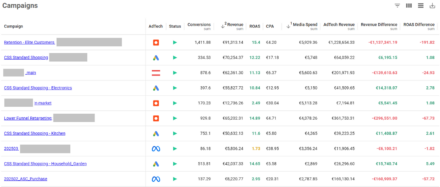SEO In the Era of Google Uncertainty

If there’s one thing SEO experts are used to, it’s turbulence and uncertainty. With Google’s AI Overviews arriving in the UK, a US judge ruling that Google’s search monopoly is illegal, and the arrival of AI competitors like Search GPT, certainty and stability seems a long way off. With all these changes, and questions bounding around about the implications and challenges they will bring, marketers are rightly asking, ‘What on earth does this mean for my SEO practice?”.
Let’s dive into:
- Is Google’s grip on the search landscape at a tipping point?
- OpenAI enters the search arena with SearchGPT
- Google’s AI Overviews arrive to the UK’s SERPs
- Is the rise of AI-driven search a CTR disaster waiting to happen?
- Multi-format content is a necessity, not a nice to have in 2024
- Five key strategies for marketers to navigate SEO uncertainty
Is Google’s grip on the search landscape at a tipping point?
For as long as most of us will be able to remember, Google has been the uncontested king of search. However, the landscape might be on the verge of a seismic shift.
A recent ruling by a US judge declared Google’s search monopoly illegal, a decision that could have significant implications for the search giant and how they maintain their position. With this ruling, there is a chance the door could open for more competitors to challenge Google’s dominance.
This ruling also paves the way for future challenges to the power held by Google. With Google’s advertising business being equally massive, and a precedent now set that Google isn’t too big to have to answer difficult questions, could we be about to see anti-trust cases taken up against other aspects of Google’s business?
OpenAI enters the search arena with SearchGPT
AI-driven search engines are just around the corner, and with OpenAI announcing SearchGPT in July, they are already here for a small group of users.
SearchGPT aims to leverage artificial intelligence to provide more intuitive and personalised search results. Instead of simply providing an AI overview, as per Google’s attempt at AI-powered generative search, SearchGPT aims to present and sort information for the user, providing context and attributing where it found the information.
As these AI competitors rise, the traditional search experience we’ve become so accustomed to could start to look very different, as it has with the arrival of Google’s AI Overview into the SERP in the UK.
Google’s AI Overviews arrive to the UK’s SERPs
AI is reshaping the search landscape and nowhere is this more visible than Google’s SERPs. With Google’s AI Overviews now available in the UK, we’re beginning to see how AI is changing the way users interact with the SERP. This AI integration allows users to receive more context-rich answers directly within the search results, potentially reducing the need for users to click through to websites for information.
However, it’s important to note that this AI-driven experience is still in its experimental stages. We’re beginning to see these AI overviews across most searches, however, the rollout has been nothing short of colourful (hello putting glue on your pizza!).
This all means that while AI is beginning to influence search practices, it’s not yet the dominant force. But make no mistake, it’s coming and you need to get ready for it.
Is the rise of AI-driven search a CTR disaster waiting to happen?
One of the most pressing concerns with the AI-powered search rollout is the potential decline in Click-Through Rates (CTR). As AI increasingly answers users’ questions directly in the SERPs, there’s a growing risk that fewer users will feel the need to click through to actual websites. For informational queries, this could be a real challenge, as the need for a click is essentially removed once the answer is provided upfront, and evidence is pointing to up to a 60% reduction in CTR.
That said, this shift is less likely to affect transactional queries—at least for now.
Users searching for products or services must still click through to complete a purchase or engage with a service! However, this doesn’t mean marketers can afford to be complacent. With the ever-present onward march of technology, as AI becomes more adept at understanding and responding to complex queries, there is no reason transactional searches won’t also see a shift in user behaviour.
Multi-format content is a necessity, not a nice to have in 2024
In light of these changes, the importance of multi-format content is set to grow. The new AI-driven slots in the SERPs mean that brands need to diversify their content strategy to land in one of the coveted AI-overview links. Gone are the days when text alone could carry your SEO efforts.
In 2024, it’s about having a rich mix of images, videos, and even interactive content to capture as many opportunities as possible to appear in search results.
Multi-format content not only caters to varied user preferences but also enhances your chances of being featured in different sections of the SERPs, whether that’s in traditional links, image carousels, or video snippets. Multi-format content is a content strategy that can help mitigate the risk of CTR decline by offering multiple touchpoints for user engagement.
Five key strategies for marketers to navigate SEO uncertainty
1- Stay informed and ready to act: Regularly update your knowledge on SEO trends, particularly around AI advancements, and be ready to pivot your strategy at a moment’s notice.
2- Diversify content formats: Ensure your content strategy includes a variety of formats—text, video, images, infographics—to increase your chances of appearing in different SERP slots.
3- Prioritise transactional queries: Prioritise optimisation for transactional queries, as these are less likely to be impacted by AI-driven answer boxes.
4- Optimise for AI: Start experimenting with optimising content for AI summaries and overviews, ensuring your content is concise, relevant, and authoritative.
5- Monitor performance metrics closely: Keep a close eye on your CTR and other key performance indicators to identify any shifts in user behaviour, and be ready to adapt accordingly.
In this era of Google uncertainty, staying ahead of the curve means being proactive, adaptive, and always ready to embrace the next wave of changes in the SEO landscape. To help you stay on the front foot, consider contacting our team of SEO experts to help guide you in making positive steps towards SEO success.
Get in touch to find out more about what our SEO team can do for you!
What makes QueryClick different?
Download our services brochure to find out.
Own your marketing data & simplify your tech stack.
Have you read?
Chrome’s announcement on dropping cookie opt-in last month closed the door on a 5 year saga for marketers. But what is the landscape like in 2025 for cookie-based measurement?
Generative AI is transforming the way that marketers plan and assemble content for their Paid Ads. As big platforms like Google, Meta and TikTok increasingly build the tools needed to...
In a surprising move that has sparked heated debate, Mark Zuckerberg announced on his Instagram that Meta will be reducing its levels of censorship and in particular fact-checking on its...


